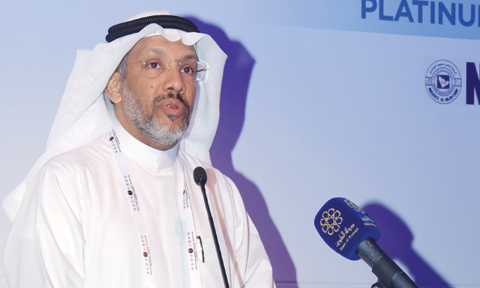Hydrogen Remediation Conference 2017 underway
 Mohamed Al-Mutairi
Mohamed Al-MutairiKUWAIT: Kuwait's capacity to handle the remaining oil with hydrogenation processing will be 758,000 barrels per day (bpd) by the completion of the Clean Fuel Project, compared with the current capacity of 228,000 bpd, Kuwait's National Petroleum Company (KNPC) CEO Mohamed Al-Mutairi said yesterday.
Mutairi said in a speech at the opening of the Hydrogen Remediation Conference 2017 that Kuwait is on its way to become one of the largest centers in the hydrogenation treatment of remaining oil. He added that the hydrogenation treatment of the remaining oil has been in use for several decades, pointing out that technology has been slow except for limited developments in prolonging the cycle of the use of catalysts and in the quality of the product.
The three-day Hydrogen Processing Conference (2017) is the first international meeting to be held under the auspices of Kuwait's Oil Minister and Minister of Electricity and Water Essam Al-Marzouq. He explained that the conference will discuss how to direct the industry to add new capabilities in addressing the hydrogen-processed remaining oil and the challenges facing existing technologies in this regard.
Mutairi pointed out that the conference will also discuss ways of reducing the cost in the treatment of hydrogen-processed remaining oil and best practices in operations, troubleshooting and treatment as well as trends in the future industry. Meanwhile, Chief Executive Officer of Kuwait Petroleum Corporation (KPC) Nizar Al-Adsani said that the refining industry witnessed a qualitative leap in the international markets as a result of the recommendations of the International Convention for the Prevention of Pollution from ships to reduce the sulfur content in ship fuels as well as the continuous changes in energy demand, economic growth and new challenges such as electric cars.
Adsani said that marine fuels had undergone rapid changes as a result of the decision of the International Maritime Organization (IMO) to reduce the sulfur content in marine fuels used in open seas from 3.5 to 0.5 percent and expected to become effective by 2020. He explained that these restrictions will be a challenge for refineries as they have to plan what to do with respect to remaining oil with high sulfur content that can no longer be mixed in the fuel of ships. - KUNA










